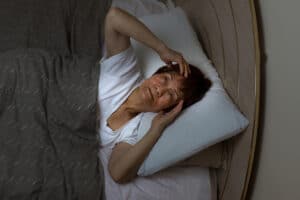The notion that seniors don’t need much sleep is a myth. The truth is that many seniors don’t get much sleep. But that’s not a normal part of aging, it’s a health problem. Whether it’s difficulty falling asleep or staying asleep, insomnia in older adults is common, and it is cause for concern.
Causes of insomnia in the elderly

Elder Care Altadena, CA: Seniors and Insomnia
Chronic health issues can interfere with a good night’s sleep. Unfortunately, many of the medications used to treat chronic health issues can also cause insomnia. Depression can cause lost sleep, as well.
Specific medical conditions such as restless legs syndrome and breathing disorders, like sleep apnea, are more common in people over 65. And these disorders, when untreated, definitely cause insomnia.
In addition to the above causes, overuse of caffeinated drinks and alcoholic beverages, especially near bedtime, can cause insomnia.
Tricks for beating insomnia
Insomnia may need to be treated with multiple therapies. Treatment should match the cause. The following activities and prescriptions may be useful to your senior in overcoming insomnia:
1.Exercise–Moderate exercise, like low-impact aerobics, free weight lifting, and walking can make a huge difference in the amount and quality of sleep that some seniors get.
2. Keeping to a consistent sleep schedule–Going to bed at the same time and getting up at the same time helps many people correct dysfunctional sleep cycles. Seniors who can go without a daytime nap should do so, because napping can interfere with nighttime sleep quality.
3. Staying out of bed when not tired–Sleep scientists believe that the more time a patient spends in bed not sleeping, the poorer his sleep gets. To avoid hours spent trying to fall asleep, seniors should only go to bed when tired.
4. Bright light therapy–Sleep scientists developed bright light therapy to combat the early evening sleepiness that can lead to napping and bad sleep cycles. In this therapy, the patient is exposed to bright lights for a few hours in the late evening and early night time. This treatment helps seniors stay awake longer, go to bed later, and, hopefully, get better sleep.
5. Caffeine avoidance–While a cup of coffee in the morning may not be keeping your senior from falling asleep, drinking coffee throughout the day and into the evening is a definite no-no for people who suffer insomnia. Ask your senior to limit caffeine or go without it altogether. An elder care professional can help your senior find alternative stimulation to caffeine.
6. Medications–When all else fails, seniors should be prescribed sleep medications that can restore a healthy sleep cycle. Rather than using over the counter sleep meds, seniors should see a doctor who can prescribe a safe choice.
Home care can help
Professional elder care can be invaluable when it comes to helping your senior parent get a good night’s sleep. Elder care professionals can assess whether a senior is getting enough sleep at night or napping too frequently. In addition, elder care workers can read the signs of sleeplessness which leads to daily exhaustion and increased slowness and confusion. Finally, home care pros know how to tackle insomnia, and they can make many safe recommendations.
If you or an aging loved-one is considering Elder Care in Altadena, CA please contact the caring staff at Nu Care Inc. today at. 800-505-6890
Sources
https://www.mayoclinic.org/diseases-conditions/insomnia/symptoms-causes/syc-20355167
https://www.ncbi.nlm.nih.gov/pmc/articles/PMC5991956/

